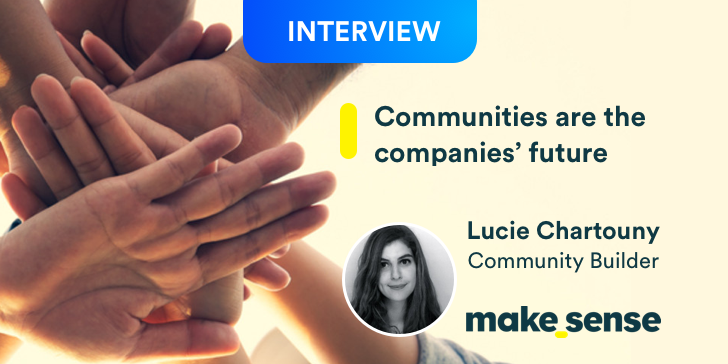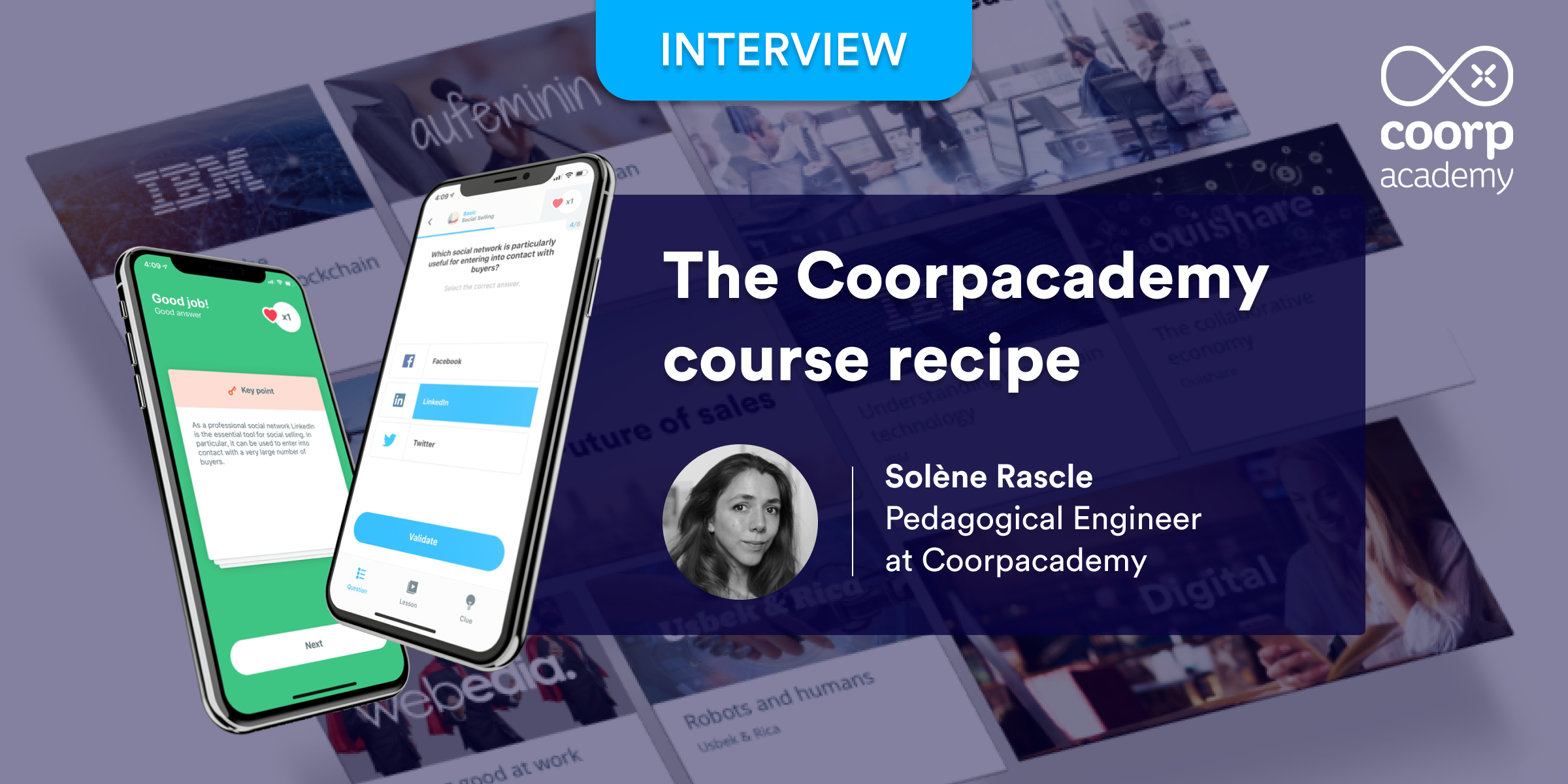Communities are the companies’ future!
Interview

Coorpacademy has co-edited with makesense a new online course on the creation of communities within or for companies. Communities can bring a lot to organizations: they can stimulate innovation, create customer or employees loyalty, spread new work cultures… Lucie Chartouny, Community Builder at makesense and co-founder of the community of the paumé·e·s (lost, in French), gives us insights on her experience in building communities. It seems like the revolution of the collective in corporations will continue to surprise us!
Question: Let’s start with an easy question! What does a community represent for an organization? Do communities and companies go so well together?
Actually, there is not one single and universal definition of communities, because this word is used differently and specifically according to people, contexts and cultures. Most usually, we call a community a group of people gathering together around a common reason. More precisely, we are going to call ‘community’ a group of people united by a common vision – such as making a company’s products more sustainable, for example – or by their situation – such as a group of entrepreneurs – who work together to reach a shared goal.
I’m convinced that communities embody the future of companies.
I’m convinced that communities embody the future of companies – which means that the future of corporations will be shaped around a communitarian approach. Having a group of people who want to act together, to make projects happen allows companies – and we’ve seen this in the times of crisis we’re currently living in – to be proactive, resilient, to have a decentralized approach and in fine save time and find the most accurate solutions to problems.
Corporate communities bring real game-changing differences. Some are used to engage and connect either coworkers or third-parties, on specific projects like sustainability or social responsibility. Others are used to share and promote good practices and/or the right tools. The last kind that we can observe is innovation and creativity communities which aim at reaching a strategic objective. What we observe on the field will then help finding a different approach than more classic ones.
Q: Could the development of communities be at the same time the development of democracy within companies?
Communities can impact governance, but it’s a long process. It can take time to transform dynamics and engagement methods of coworkers. At makesense, we’re convinced that communities are ways of engaging coworkers which complete what already exists.
Q: Have you created the paumées’ community with this vision of social engagement?
I’ve co-created the paumées’ community (la communauté des paumé·e·s) with two coworkers in 2018, Aurore Le Bihan and Simon Drouard. We started it from our personal impressions and not from an intellectual approach around engagement. The three of us were going through a phase of professional transition.
We felt lost, and personally speaking, I didn’t know with whom I could share my questioning and I didn’t know why I couldn’t find any information on how to search for meaning in your work.
We felt lost, and personally speaking, I didn’t know with whom I could share my questioning and I didn’t know why I couldn’t find any information on how to search the meaning of your work. While discussing with Simon and Aurore, and because we like to use a collective approach at makesense to do things, we wanted to help all people who, like us, were asking more questions than they were getting answers. We’ve then created the first event of the paumées’ community, just to be together, to share why we were feeling lost and to try to help each other. Aurore, who’s a big fan of podcasts, gave the microphone to some ‘lost’ (paumés) people who were going further in their thinking processes and who were starting interesting projects. Today, we’re more than 15,000 members everywhere in France and there have been hundreds of events, usually initiated and organized by “super lost” members, 200 very engaged members of the community in Nantes, Montpellier, Lyon and who share the values of the community.
Q: Must the rationale of the community be very clear and asserted, like in a manifest, for a community to be successful?
It is true that all paumé·e·s members share the conviction that a period of “being lost” is a very healthy period, that can be lived with optimism. Maybe it will make us drift apart from people who are suffering in those times, but we need to be clear on our rationale.
The goal and the rationale of “les paumé·e·s” is finding meaning at work. This was already a very current topic, but there were not a lot of answers, except when having a very individual coaching or personal development coach. Not a lot was done to answer those questions collectively. I think that a lot of “paumés” recognized themselves in this community because we have created it while having fun, not being too serious. But the rationale of it is very clear, and there are tools, a manifest, that are available to all. The fact that we launched it in other parts of France also, and not only in Paris, can explain part of the success.
Q: When can we call a community successful?
It can sound a bit cheesy, but I feel like our community has been successful when, during an event with the most engaged members, they tell how their engagement in the community changed their lives and how the community was helping them in their personal development. For example, one member told the story of how organizing events for the community helped rebuild his confidence after a burn-out. Actually, members of the community showed us how the community helped them and how individual change can make a difference collectively.
Q: If you had one advice to give to anyone wanting to build a community – other than to follow the course co-edited with Coorpacademy, what would it be?
Building a community can sound a bit scary at first. But you can tell yourself: “I will organize an event and I think this topic is important” and then take the leap, especially in the professional context where a lot is at stake (what will your manager think? Your coworkers? Is it in adequation with your own professional career path?) It’s a real risk taking. But you need to start step by step, start achieving little things, like organizing coffee breaks with the most benevolent coworkers before booking the company’s amphitheatrum!
Start little! And also, start fast, without overthinking, and learn by doing!
If I had one advice to give, it would be Gaëtan Maillet’s one, from Décathlon, that he gave during a conference on how difficult it is to animate a community within a company: Dare to dream small and start little! And also, start fast, without overthinking, and learn by doing! That’s what we’ve done with “les paumé·e·s” and it was very interesting to start a community from scratch and to see the build-up to more than 10,000 autonoumous members, where ‘super paumés’ people are acting their parts and animate parts of France autonomously.
Q: The search for meaning at work is at the heart of your community. Is it for you a major stake within companies? According to your experience within different organizations you have advised, what are the other HR stakes linked to the creation of communities?
When I joined makesense 4 years ago, the search for meaning at work was not as fashionable as today, less urgent, and I felt like that nobody really wanted to talk about it within companies.
To say the word “community” was making us look like aliens but talking about a community centered on the search for meaning in your work was a complete red flag.
To say the word “community” was making us look like aliens but talking about a community centered on the search for meaning in your work was a complete red flag.
People feared that coworkers would end up quitting the company. Since the end of 2019, I feel like it evolved a lot. The word “community” is less feared, and becomes interesting. For example, we realized that in some communities, people were staying in their companies thanks to the communities within the company. Because they meet people that they wouldn’t meet otherwise, they learn new things and don’t get bored. Communities are a real tool to retain people and talents, to fidelize them. We also accompany a lot of communities around digital culture, with a lot of data scientists, a profile sought-after in the work market. Rapidly, they can get bored because their jobs are very technical, not always understood, and being part of a community around digital culture can help them stimulate each other, share insights and learn from each other every day. What is very interesting in how communities retain coworkers is that people usually gather around a sustainable goal or objective, linked to the social responsibility of their companies or missions.
Nowadays, companies have realized that the search for meaning at work is unavoidable. Either they make their communities evolve, or they create new ones around collaboration, around continuous learning of their coworkers, to retain them.
Nowadays, companies have realized that the search for meaning at work is unavoidable.
Q: What is the most memorable corporate community project you’ve accompanied?
I work with Ecowork, a community around the sustainable city at Vinci. It’s a very complete project. At the beginning, we were organizing most of the events at makesense, but step by step, members became autonomous. Today, they create their own methods to transform their answers to call for tenders and add sustainable aspects to them. They now organize their own afterworks events around the circular economy, for example. They have complete ambassadors programs, training programs around sustainable topics and it makes the views around environmental protection evolve at Vinci.
All employees we are working with are asking for this.
All employees we are working with are asking for this. They usually are very engaged people, with a real desire to understand environmental stakes, transform their jobs to be as engaged in their companies as they are in real life, personally. The community helps them in making their daily professional lives more engaged, by being connected to the right people and by getting the right tools and methods. New communities are really linked to new work methods. At Vinci, Ecowork increased collaboration between their numerous branches and between all employees with this goal of making the world a better place.
Thanks Lucie, this topic is very interesting and infinite!
If you want to go further, discover the course “How to build a community” by makesense on all Coorpacademy platforms.
Lucie Chartouny, Community builder at makesense, is the co-founder of the paumé.e.s (lost) community, gathering thousands of millennials searching for meaning, especially in their professional lives. She helps organizations to give meaning to their collective projects and helps them building and developing communities within them.
makesense In 2010, a bunch of young people wanted to put their skills to work wherever they could help social entrepreneurs make a difference. Very quickly these citizens of the world started to connect to other citizens. They all shared the same desire to help innovative entrepreneurs solve social and environmental issues by sharing their knowledge and continuing to learn along the way. makesense was born! And with thousands of citizens and social entrepreneurs engaged across the world to build local solutions for the most pressing issues of our times, a community was born! The collaboration with governments, local authorities and companies was an important ingredient of the recipe. It allowed us to scale up the best solutions to have a true and significative positive impact.


